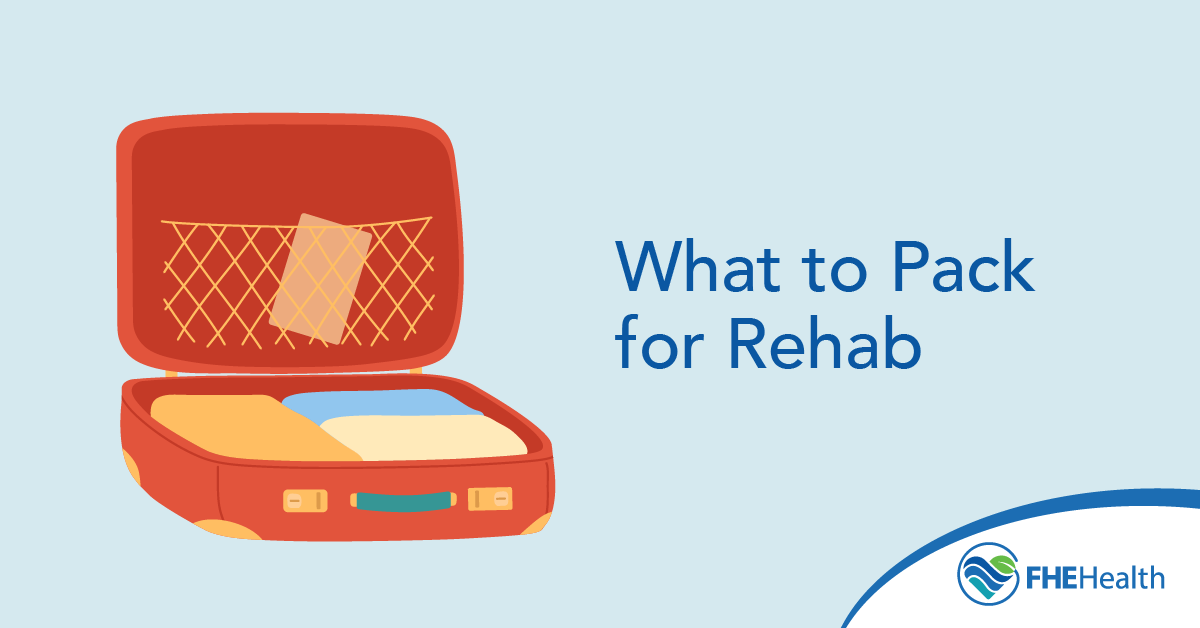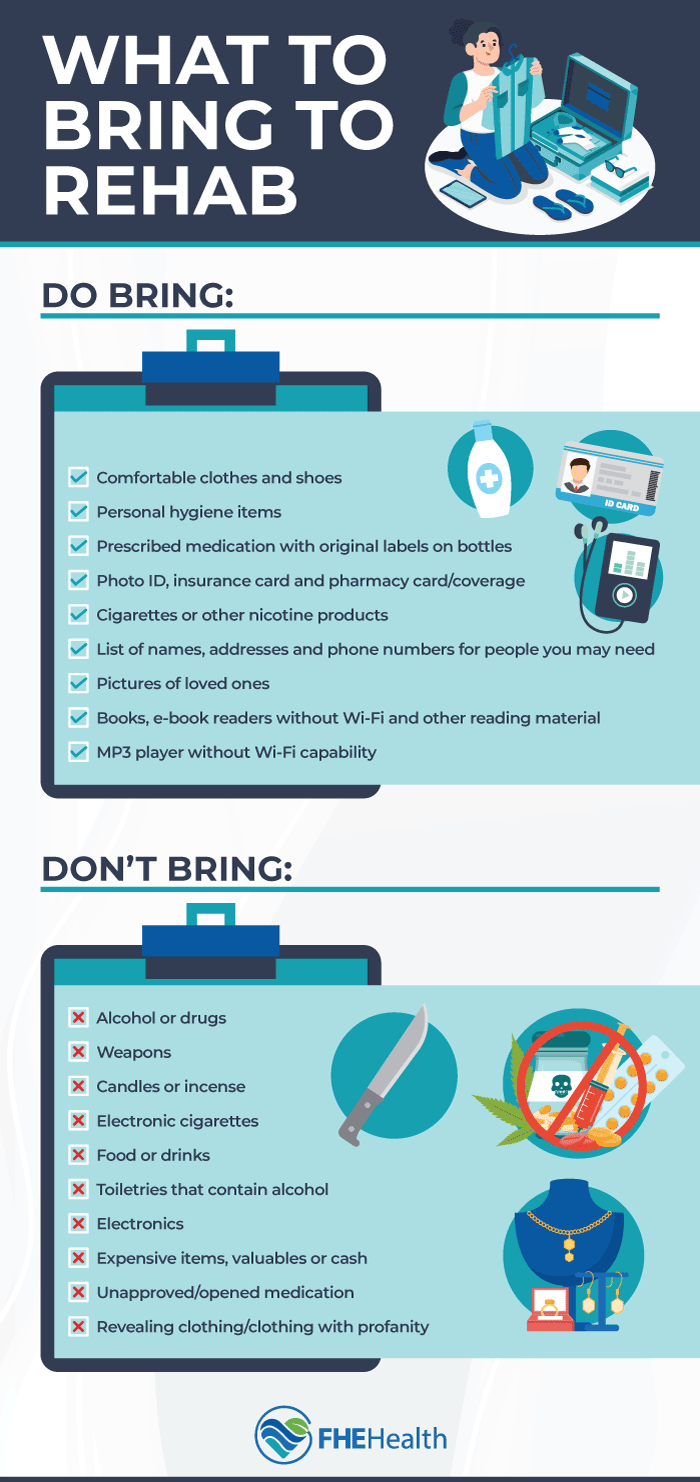
As you prepare for rehab, knowing what to bring can make your stay more comfortable. Generally, residential treatment programs expect you to bring basic personal items. They may also put restrictions on items that aren’t conducive to recovery.
Below, we highlight the items you should take to rehab and list a few that you should leave at home.
Essential Personal Items for Comfort and Functionality
Clothing
Rehab facilities expect you to come with all the clothing you’ll need for the duration of your stay. You should be able to do laundry on-site regularly, so packing a week’s worth of clothes is a good baseline. It’s also a good idea to find out whether the rehab facility has a dress code policy.
When deciding what to pack, prioritize practicality and comfort. Most residents choose to leave clothing with special wash instructions at home. Consider the local climate and the types of activities you’ll be participating in. If you tend to feel cold indoors, you may want to pack a couple sweatshirts or cardigans. Additionally, you may want to pack one or two outfits for special events.
Some basic items to make sure to pack include two weeks of clothing (can be cleaned on FHE Health property):
- Shirts (no clothing with inappropriate labels)
- Pants
- Undergarments
- Sleepwear
- Shoes, including athletic shoes, slippers and shower sandals
Toiletries and Personal Care
Having your own toiletries can be a comfort when you’re away from your normal environment. Rehab facilities may have travel-size products on hand for those who forgot to pack an essential item, but generally speaking, the expectation is that you will bring your own. Depending on your needs, some things to pack include:
- Toothbrush and toothpaste
- Hair cleaning and styling products (that do not contain alcohol)
- Body wash
- Feminine hygiene products
- Skincare products(that do not contain alcohol)
- Lotion
- Makeup
- Hairbrush or comb
- Deodorant
Miscellaneous Essentials
Aside from basic clothing and hygiene items, your rehab packing list may include these essentials:
- Prescription medications (must be in labeled bottle)
- Glasses, contact lenses and related supplies
- Books
- Journals
- Puzzle books or similar entertainment
- Electronics with their chargers
Documents and Information to Bring
Having all your important personal documents on hand when you enter a rehab facility can ensure a smooth admission process. It facilitates your transition into the program and is necessary for ensuring the facility has the information it needs to provide the best possible care.
Identification Documents
Don’t leave your key identification documents at home. Some items to bring include:
- Personal identification, including a driver’s license or government-issued ID card
- Your health insurance card
- Your prescription drug card (if it’s different from your health insurance)
Medical Information
Your customized treatment plan is tailored to your unique needs and medical history. To ensure you receive effective treatment, bring this information to inpatient rehab:
- Your medical history and any relevant records
- A list of your current prescriptions
- Contact information for your regular health care providers
- The names and contact details of your emergency contacts
Financial Information
Considering the financial aspect of your rehab stay can help you ensure you have everything you need to enjoy a comfortable stay and seamless care. This includes:
- Payment information (if needed), including a credit card, debit card, or checks
- A small amount of cash in low denominations for vending machines or personal expenses
Prohibited Items: What to Leave at Home
While knowing what to take to rehab can make your stay more enjoyable, it’s just as important to know what to leave at home. Residential facilities strive to create a secure, comfortable environment for individuals ready to begin their recovery journey. To do this, they prohibit certain items that could trigger a relapse or sacrifice the safety of the group.
Before arriving at the rehab facility, it’s a good idea to contact the facility for a list of restricted items. Some common items you may be asked to leave at home include:
- Drugs, including prescription medications you don’t have a current prescription for and over-the-counter medications you don’t have prior approval for
- Alcohol
- Weapons, including firearms, ammunition, and knives
- Expensive jewelry
- Large amounts of cash
- Toiletries that contain alcohol, such as perfume and mouthwash
- Aerosols
- Candles or incense
- Clothing with profanity, political statements or references to drugs, alcohol, or violence
- Synthetic nail products
- Outside food and drinks
Additionally, many rehab facilities don’t allow residents to have laptops or tablets on hand, and they may limit access to smartphones. Understand your facility’s policies ahead of time to avoid confusion and frustration. However, if you bring a prohibited item by mistake, don’t worry – you will get your belongings back at the end of your stay, as long as the facility can legally return it to you.
Tips for Packing With a Recovery Mindset
Rehab is the first step toward recovery, and it requires a lot of courage and determination. As you put together your own packing list and prepare for your time as a resident, adopting a recovery mindset can give you the perspective you need to pack wisely. By thoughtfully choosing the items to bring, you can promote an environment that facilitates your recovery and empowers you to embrace your journey with positivity.
Prioritize Simplicity and Comfort
It’s normal to want to put your best foot forward, especially in a new situation. However, as you plan your rehab wardrobe, your primary focus is on choosing comfortable items. Opt for clothing that is loose-fitting, soft, and easy to wear. Comfortable shoes and warm socks, along with comfort items such as a favorite blanket or pillow, can help you feel calm and at ease.
It’s also important not to overpack. By sticking to the essentials, you can avoid the stress of too much baggage and focus on your recovery.
Focus on Healing and Recovery
Aside from ensuring you have the proper clothes and toiletries needed, many rehab residents find it helpful to bring items that support their mental and emotional health. This may include a journal for reflection, a coloring book or puzzle book, or inspirational fiction or nonfiction books. Depending on the facility’s rules, downloading favorite music or podcasts onto a device can provide encouragement during challenging moments.
Prepare for New Routines
Rehab offers a prime opportunity to establish new routines. To help you stick to a new exercise regimen, consider packing exercise bands or a yoga mat. This is especially helpful if your recovery includes physical therapy. Many residents also find it helpful to bring items such as planners to keep track of goals and appointments, or reusable water bottles to help them remember to stay hydrated.
Your packing list for rehab should include the essential items you need to stay comfortable and focus on your healing for the duration of your stay. Basic clothing and toiletry items and important personal and medical documents help make the move as easy as possible. Similarly, knowing what items to leave at home can prevent frustration.
If you have any questions about what you should bring to our Florida drug rehab and what’s prohibited, talk to an FHE intake specialist.







